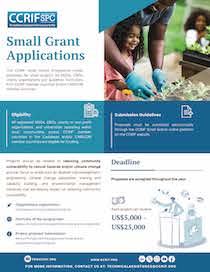St. Kitts & Nevis, December 6, 2024. The Government of Honduras received a payout of US$4,665,090 within 14 days of an excess rainfall event that affected that country over the period November 14 to 19, 2024. The Government of Honduras joined CCRIF in 2024, purchasing parametric insurance coverage for excess rainfall, effective June 1, 2024. On receipt of the payout, Minister of Finance Christian Duarte delivered the following statement, "On behalf of the Government led by our President Xiomara Castro, we express our gratitude to CCRIF for the disbursement received under our excess rainfall policy, which was triggered due to the impacts and damages associated with Tropical Storm Sara. Without a doubt, this type of instrument strengthens financial resilience and, compared to others, it provides us with the ability to respond more immediately during the humanitarian assistance and rehabilitation phase of an emergency. Additionally, it enables us to reach our affected population promptly and effectively”.
In speaking to the payout, CCRIF CEO Mr. Isaac Anthony stated, “I am pleased that Honduras took the decision to join CCRIF and I look forward to continuing to engage with the Government as it accesses CCRIF parametric insurance as an effective means of closing the protection gap and strengthening the country’s public financial management framework. Access to excess rainfall parametric insurance and accompanying payouts when the policy is triggered will allow the Government the flexibility to begin recovery efforts immediately following a natural disaster. Payouts received within 14 days of an event can be used to address the country’s most urgent needs, including helping vulnerable populations or rehabilitating critical infrastructure among other areas.”
According to reports, the rainfall event in Honduras significantly impacted roads cutting off several communities and negatively impacting many people.
Since its inception in 2007, CCRIF has made 78 payouts approximately US$390 million. Since the start of the 2024/2025 CCRIF Policy Year which began on June 1, three of CCRIF’s four Central American members have received payouts for excess rainfall events. Earlier in November, the Government of Panama received a payout from CCRIF totalling US$26.7 million. At the start of the policy year in June, the Government of Guatemala received a full payout under its excess rainfall policy of US$6,376,184 following heavy rains that occurred in that country, over the period June 13 – 19, 2024. On the Caribbean side, since the start of the policy year, CCRIF has made 10 payouts totalling US$84.5 million following Hurricane Beryl. The Government of Grenada received US$44 million under its tropical cyclone, excess rainfall and COAST (for fisheries) policies. The water and electric utility companies of Grenada received payouts totalling US$11.5 million. The Government of Jamaica received two payouts under its rainfall and tropical cyclone policies totalling US$26.6 million. Other governments – Trinidad & Tobago, and St. Vincent and the Grenadines as well as the Cayman Turtle Conservation and Education Centre (a government-owned tourist attraction) also received payouts.
When CCRIF was established in 2007, it originally provided parametric insurance coverage for tropical cyclones and earthquakes to 16 Caribbean member governments. Today CCRIF has 30 members – 19 Caribbean governments, 4 Central American governments, 3 Caribbean electric utility companies, 3 water utility companies and 1 Caribbean tourist attraction. Today CCRIF makes available 6 parametric insurance products – the original two as well as parametric insurance products for excess rainfall and for the water and electric utility sectors as well as for the fisheries industry.
Nicaragua was the first Central American country to join CCRIF, when COSEFIN1 and CCRIF signed a memorandum of understanding in 2015 to enable COSEFIN members to gain access to CCRIF’s parametric insurance products. Panama joined in 2018 and Guatemala in 2019.
CCRIF CEO, speaking from the 13th Conference on Comprehensive Disaster Management (CDM) in St. Kitts and Nevis, stressed that, “We are committed to improving the resilience of the Caribbean and Central America to climate change and natural hazards. By this we mean increasing the ability of governments and key sectors to reduce the negative impacts of natural disasters on their economies, communities and citizens. We view comprehensive disaster risk management (CDRM) as an integral component of sustainable and resilient development and view parametric insurance as a critical part of countries’ CDRM strategies. This commitment is explicit in our vision - a leading global development insurer, providing disaster risk financing products and services to our members to improve lives and livelihoods, building resilience and advancing sustainable development agendas”.
About CCRIF SPC:
CCRIF SPC is a segregated portfolio company, owned, operated, and registered in the Caribbean. It limits the financial impact of catastrophic hurricanes, earthquakes, and excess rainfall events to Caribbean and Central American governments by quickly providing short-term liquidity when a parametric insurance policy is triggered. It is the world’s first regional fund utilising parametric insurance, giving member governments the unique opportunity to purchase earthquake, hurricane and excess rainfall catastrophe coverage with lowest possible pricing. CCRIF offers parametric insurance policies to Caribbean and Central American governments for tropical cyclones, earthquakes, excess rainfall and fisheries and also to electric and water utility companies in the Caribbean. CCRIF was developed under the technical leadership of the World Bank and with a grant from the Government of Japan. It was capitalized through contributions to a Multi-Donor Trust Fund (MDTF) by the Government of Canada, the European Union, the World Bank, the governments of the UK and France, the Caribbean Development Bank and the governments of Ireland and Bermuda, as well as through membership fees paid by participating governments. In 2014, the Central America and Caribbean Catastrophe Risk Insurance Program (CACCRIP) MDTF was established by the World Bank to support the development of CCRIF SPC’s new products for current and potential members and facilitate the entry of Central American countries and additional Caribbean countries. The MDTF currently channels funds from various donors, including Canada, through Global Affairs Canada; the United States, through the Department of the Treasury; the European Union, through the European Commission, and Germany, through the Federal Ministry for Economic Cooperation and Development (BMZ) and KfW. Additional financing has been provided by the Caribbean Development Bank (CDB), with resources provided by Mexico; the Government of Ireland; and the European Union through its Regional Resilience Building Facility managed by the Global Facility for Disaster Reduction and Recovery (GFDRR) and the World Bank. In 2024, CCRIF received funding from CDB, through the Canada-CARICOM Climate Adaptation Fund, to enable seven CCRIF members to increase their coverage and make their national social protection systems more shock responsive.
For more information about CCRIF SPC: Website: www.ccrif.org | Email: pr@ccrif.org
Tag us:
Twitter: @ccrif_pr
Facebook: @ccrif.org
Instagram: ccrif_spc
LinkedIn: @ccrif spc
YouTube: https://youtube.com/@ccrifspc75
#ccrifspc #honduras #cosefin #centralamerica #caribbean #rainfall #payout #naturaldisaster #catastropheriskinsurance #disasterriskfinancing #parametricinsurance #climatechange #lossanddamage
1Council of Ministers of Finance of Central America, Panama and the Dominican Republic





